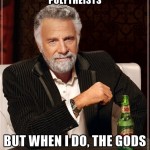Recently, my kids admitted to my wife that they have never felt “the Spirit” at church. “Feeling the Spirit” is probably the quintessential Mormon spiritual experience, so this is a big deal in our family which is Mormon and Pagan. Like my wife, I myself have “felt the Spirit” many times in my life — although I would now use different (more Pagany) language to describe what I was feeling then, and obviously I now have a different interpretation of what those feelings meant. In my daughter’s case (she’s 12), it may just be a matter of age. But in my son’s case (he’s 15), I’m starting to think it may be a matter of temperament.
I have often wondered what the difference is between myself and other members of my family who show little to now interest in spiritual matters. Are they spiritually insensitive? And if so, is that a bad thing? Or maybe I am the one who is defective. Maybe spiritual sensitivity is just weakness or delusion. On a larger scale, I wonder about the a-religiousness of most Western European countries: Denmark seems like a pretty nicce place to live, but I have difficulty making sense of their general apathy about spiritual matters.
A related issue is the differences among those who are spiritual, but express their spirituality differently. There has been some debate in the Pagan blogosphere recently about monism vs. polytheism. This issue to my attention again recently on Facebook when David Dashifen Kees posted the following question: “Some people are colorblind. Can people be god blind? I.e. unable to see some or all types of deity?” While Kees was just curious and hoping to generate discussion, I often see language like this from devotional polytheists which suggests that other kinds of Pagans are deficient in some way (i.e., “blind”). To be fair, Naturalistic Pagans like myself sometimes talk like polytheists are delusional. Cat Chapin-Bishop (who we are now fortunate to have at Patheos) posted a wonderful response to Kees entitled, “My Polytheistic, Mystic, Monist Heart”. She raises an interesting question:
“… too often, we judge one another on how we perceive the Mysteries around us. But what if our differences in understanding are neither good nor bad, neither distortions of experience nor reflections of utterly different experiences, but simply how each of us has been allowed to get a brief glimpse of something that doesn’t fit into words at all?”
I recently heard Rabbi Lawrence Kushner say, “A mystic is anyone who has the gnawing suspicion that the apparent discord, brokenness, contradictions, and discontinuities that assault us every day might conceal a hidden unity.” The word “gnawing” stood out to me. Jung described something similar when he said that “a secret unrest gnaws at the roots of our being.” This “gnawing” suspicion or unrest is something I am intimately familiar with. A “gnawing suspicion” is not conceptual; it is visceral. It is a feeling, an intuition. And I am coming to believe that intuition of unity in the mystic, the intuition of diversity in the polytheist, as well as the absence of these intuitions in the atheist, are constitutional, maybe biological. It’s not something we earn, so much as something we are blessed (or cursed) with. And as Cat Chapin-Bishop argues, this should be sufficient reason for us to be charitable with one another regarding the differences in our spiritual perceptions:
“If my own life’s story is anything to judge by, however, there is indeed such a thing as true love–even if it can’t be weighed or measured or graphed. But can I claim to have earned it? That it implies I am a better person than those whose experience with love hasn’t lived up to our culture’s hype? Even I am not that arrogant.
“I will admit, I would not want to live differently, in my spiritual or my romantic life. For myself, at least, I think of my own spiritual and romantic perceptions as ‘best, in the sense that I wouldn’t want to trade with someone whose life story is different in those ways. But Can I take credit for the different spiritual insights I’ve been lucky enough to have had? Maybe–at least that I’ve been open to having them, to ‘tasting’ them. But not, I think, to how they have tasted to me.”
In 1929, Aldous Huxley published an essay entitled “One and Many”, in which he discussed the merits of polytheism and monotheism. While technically he is an agnostic, Huxley makes the argument that a new polytheism is needed to balance the excesses of monotheism. I’ll write more about Huxley’s polytheism in a future post, but for present purposes, what I found interesting about Huxley’s essay was his use of the terms “unity-perceivers” to describe monotheists (and monists) and “diversity-perceivers” to describe polytheists, and the terms “unity-feeling” and “diversity-feeling” to described their respective experiences. In Huxley’s view the difference between monists and polytheists, then, is not a matter of choice, but a matter of perception or feeling, which he describes as a “gift” or a “talent”.
Huxley writes, “Monotheism and polytheism are rationalizations of distinct psychological states, both undeniably existent as facts of experience, and between which it is impossible for us, with the merely human faculties at our disposal, to choose.” He explains, “Those in whom the unifying tendency predominates, whether in the form of a mystical gift for feeling the world’s oneness, or of a talent for generalization and abstraction, worship one God. Those who are conscious predominately of their own and the world’s diversity worship many Gods.” Huxley goes on to state that, not only is “God” (or the Divine) different for different people, but it can be different for the same person at different times: “Even the same [person] is not consistently the worshipper of one God. Officially an agnostic, I feel the presence of devils in a tropical forest. Confronted, when the weather is fine and I am in propitious emotional circumstances, with certain landscapes, certain works of art, certain human beings, I know, for the time being, that God’s in his heaven and all’s right with the world.”
While I am a unity-perceiver by nature, like Huxley, I think that, after 2000 years of monotheism, our society needs a healthy dose of diversity-perception. But I think that there are both advantages and disadvantages to each perspective, and that is why we need both. I think it would be beneficial if we as a community would stop looking at one another as deficient because we perceive divinity differently. It’s natural, when we discover something beautiful, to want to share it, and even to get frustrated when other’s can’t see it. (“It’s right there! I’m pointing right at it!”) But the fact is that our perceptions are selective. And by attending to one for of beauty, we necessarily cut ourselves off from other forms (at least temporarily). The problem comes when we start insisting that our limited vision is all there is to see, rather than a piece of the puzzle. The polytheists among us may be better able to apprehend the diversity of the world, while the monists may be better able to take a wider view. In the extremes, the first can be myopic and the second reductionistic. That’s why we need each other: our respective visions complement each other. And what then to make of the people who see nothing where others of use see the One or the Many? If nothing else, I am grateful to atheists because they continually cause me to question my perceptions, to look again, and think again.
















